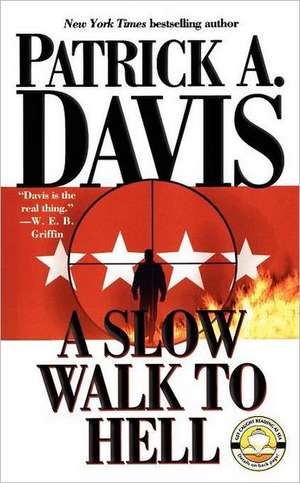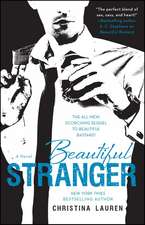A Slow Walk to Hell
Autor Patrick A. Davisen Limba Engleză Paperback – 30 sep 2010
Air Force investigator Martin Collins is used to bucking the system in the name of justice. But when he is called on to investigate the torture-style slaying of Major Franklin Talbot, Collins is embroiled in the most controversial case of his career. Evidence suggests that the deadly act was a hate crime -- and that Talbot was hiding a shocking secret that may have sealed his fate. Even more shocking are the suspects: all high-ranking officers -- including Talbot's
own uncle, a leading presidential candidate.
Traversing a politically charged minefield of buried secrets, Martin is targeted by powerful forces that cannot afford to let him identify Talbot's killer. And when he finally uncovers the devastating truth, Martin will be forced to make a fateful decision between catching a sadistic murderer -- and destroying the lives of countless innocent men.
Preț: 154.71 lei
Nou
Puncte Express: 232
Preț estimativ în valută:
29.60€ • 30.99$ • 24.50£
29.60€ • 30.99$ • 24.50£
Carte disponibilă
Livrare economică 15-29 martie
Preluare comenzi: 021 569.72.76
Specificații
ISBN-13: 9781451613063
ISBN-10: 1451613067
Pagini: 448
Dimensiuni: 127 x 203 x 25 mm
Greutate: 0.4 kg
Editura: Gallery Books
Colecția Gallery Books
ISBN-10: 1451613067
Pagini: 448
Dimensiuni: 127 x 203 x 25 mm
Greutate: 0.4 kg
Editura: Gallery Books
Colecția Gallery Books
Extras
Chapter 1
FRIDAY NIGHT
It was around 7 P.M. on a Friday evening and I was standing by the punch bowl in a drafty school gym, trying not to appear completely bored as I helped chaperone my daughter's formal middle school dance. I'd like to say that I volunteered for the duty out of a sense of parental obligation, but I hadn't. I'm Martin Collins, chief of police for Warrentown, Virginia, a small town seventy miles west of Washington, D.C., and babysitting three hundred adolescents came with the territory.
Understandably my thirteen-year-old daughter Emily wasn't exactly thrilled by my presence. She made me promise not to embarrass her in any way. By "embarrass," she meant I wasn't supposed to take photographs, talk to her or her friends, or come anywhere near her.
I tried to placate her by telling her I wasn't going to wear a uniform. "So you can chill. Your friends probably won't even notice me."
She gave me her patented "get real" look. "I think it's best if you pretend not to know me, Dad."
"Might be a little difficult," I said dryly. "I'm driving you to the dance. Remember?"
She stuck out her jaw at my logic. "You know what I mean."
"Honey, I'd like to at least take a few photos for your grandmother -- "
"Dad!" She looked thoroughly horrified.
I gave up. After three books and a half dozen episodes of Dr. Phil, I still wasn't any closer to understanding the female teenage mind. My wife Nicole could have enlightened me, but she passed away from cancer when Emily was nine. My transition into the role of being a single parent hasn't been exactly smooth, but despite any mistakes I've made, Emily has turned out pretty well. She gets good grades, is popular at school, and usually does what I ask without copping an attitude.
"Fine," I told her. "I won't come within ten feet of you."
Actually, I thought it would be easy to keep up my end of the bargain, but it wasn't. At the moment, I was watching Emily slow-dance with a strapping blond kid who was already sprouting facial hair. Every so often he would casually slide a hand down her back and it was all I could do not to throw him through a wall.
I fought the impulse by draining a glass of punch, wishing it was a beer.
The song mercifully ended and the orange-haired DJ switched to a peppy Britney Spears tune. Emily and the boy reluctantly parted, but kept on dancing. I didn't like the predatory smile he was giving her and tried to intimidate him with a scowl. No dice. Raging hormone never looked my way.
I sighed. Maybe Emily was right. Maybe I shouldn't have come. Seeing her now, looking so beautiful in her long yellow dress, dancing with a boy, reminded me of how fast she was maturing. In the past year, she'd grown four inches and her figure was filling out. She wasn't my little girl any longer.
The thought of Emily growing up was difficult to accept, and not simply because she was my daughter and I loved her. Rather, it was because she looked so much like her mother. If you saw a photo of Nicole at thirteen, you'd swear that she and Emily were twins. They both had flowing auburn hair, wide cheekbones, and brilliant blue eyes that lit up when they laughed.
I felt a familiar tightness in my chest as I contemplated the wedding band I still wore. Nicole and I were married twenty years and when she died, part of me did, too. Since then, I've dreaded the day Emily would leave home to create her own life. Irrational as it might seem, I knew I would feel a sense of loss comparable to Nicole's passing.
I also wasn't looking forward to being alone.
As I watched the smiling young faces around me, I became irritated at how pathetic my life had become. If I was alone, I had only myself to blame. For a guy in his midforties, I was pretty well preserved. At six feet, I carried a trim 180 pounds, and my close-cropped blond hair had only a few flecks of gray. Over the years, I had opportunities for relationships. More than one woman had made her interest in me known.
But I'd always turned them away.
I recalled the one offer I wish I had accepted. She was someone I cared for deeply, but at the time, I still hadn't come anywhere close to shaking the ghost of Nicole. When I told this woman that I needed more time, she was understandably hurt. "Don't expect me to wait forever, Marty."
That conversation occurred eight months ago. We tried to continue as friends, but our relationship became increasingly strained. Even though we're neighbors, she began going out of her way to avoid me. It was almost comical. If I went outside to barbecue or mow the yard, she disappeared into her house, reappearing only when the coast was clear. Whenever I phoned her, she wouldn't pick up; if I stopped by, she wouldn't come to the door. On the occasions I managed to corner her, she was coolly distant and always seemed anxious to end our conversation. When I asked her about it, she said it was easier emotionally not to have any contact with me.
I almost told her what she wanted to hear then. Lord knows, I was tempted. In the end, I couldn't do it. She deserved a guy who would put her at the top of his list, who wasn't hung up on his dead wife.
So I backed off and gave her the space she wanted. It was one of the toughest things I've ever done, but at least it gave me the opportunity to see what life would be like without her.
I hated it.
Last week, I reached a decision and went by her place, ringing the bell until she finally opened the door. I told her I was ready to make a commitment.
I didn't get the reaction I expected. Instead of a big hug or a smile, I saw only an expression of sadness. She said quietly, "I told you I wouldn't wait forever."
Her tone more than her words told me what must have happened. I asked her if she was seeing someone else.
When she nodded, I felt like I'd been kicked in the stomach. I asked her if the relationship was serious and she said it was. After going oh-for-two, there wasn't anything left for me to say.
As I started to go, she said, "You're still not ready, you know."
It sounded like an accusation. I was about to argue when I noticed her looking down at my left hand. I remained silent; in my heart, I knew she was probably right. When I left, I thought I noticed dampness in her eyes.
Probably wishful thinking.
The song ended and another began. A catchy hip-hop number, with the DJ rapping out the lyrics. The guy wasn't half bad. On the dance floor, the kids cheered him on and he rapped even louder.
But all I could hear was that damning phrase in my head: "You're still not ready."
A mixture of emotions swirled through me, punctuated by a profound sense of regret. I forced my eyes to my ring finger, knowing what I had to do. Slowly, I reached down and touched the gold band. As my fingers encircled it, they began to tremble.
You're not betraying Nicole's memory, Marty. You have to move on with your life.
Twenty years of history held me frozen. I was no longer aware of the pulsing music or the chatter of nearby voices. I was only aware of the ring and what it represented.
My fingers pulled and the ring started to slide --
I stopped. My belt was vibrating.
My relief over the interruption was palpable. Before I knew it, I'd thrown back my jacket and unhooked my cell phone. The caller ID read "U.S. Government," the number blanked out. On the other end, I could dimly make out someone saying my name. The music made conversation impossible. I shouted, "Hang on a minute."
Only one government agency ever called me, and when it did, it meant only one thing.
Someone was dead.
Ditching my cup by the punch bowl, I darted past a circle of scowling girls wearing Morticia Adams makeup, and hustled out the double doors into the quiet of the hallway. By the trophy case, I spotted Coach English chatting with the principal, Mrs. Roche. Ducking into a corner, I placed the phone to my ear. A tentative voice said, "Lieutenant Colonel Collins? Sir? You there?"
The use of my former rank confirmed he was with the Air Force OSI. Before becoming the Warrentown police chief, I'd served twenty years as an investigator with the Office of Special Investigations, the Air Force's criminal investigative branch. Upon my retirement, my old boss, in an effort to retain a cadre of experienced investigators, offered me a post as a civilian consultant, focusing exclusively on homicides. It was too good a deal to pass up. Since the military isn't exactly Murder Incorporated, the workload's light, rarely more than a couple of cases a year, and when I did work, I'd earn double my military salary. I also liked the idea of investigating an occasional homicide, since it provided a nice change of pace from the small-town cop routine.
"This is Lieutenant Colonel Collins," I said.
"Sir, hold for General Hinkle..."
There was a pause as the call was transferred. Brigadier General Charlie Hinkle was the OSI commander and an old friend. It was typical for Charlie to still be at work on a Friday night. After all, that's how he made general; he'd busted his ass by putting in years of sixteen-hour workdays. Frankly, that was a sacrifice I hadn't been willing to make, which explained why I topped out as light bird.
Was I envious that my old buddy Charlie was a general officer and I wasn't?
No way. That star on Charlie's shoulder had cost him. His second wife Mary walked out on him a several months back and I couldn't recall the last time he'd spoken with his two grown kids. But, hey, he made general.
Good for Charlie.
When Charlie came on the line, his words flew out in an excited Chicken Little falsetto. It didn't necessarily mean that the sky was falling, since Charlie tended to spin up easily. "Christ, oh Christ. We got a bad one, Marty. The heat I'm feeling is unbelievable. I just got off the horn with the SECDEF and the chairman of the Joint Chiefs. They want this thing treated with kid gloves. The word is that the White House will be monitoring the investigation. Right now, the game plan is to keep the killing quiet. I mean quiet. We're under orders to keep it from the press until at least twenty-two hundred hours -- "
His words were all over the map and I had to cut in. "Slow down, Charlie. Take it from the beginning. Who the hell was murdered?"
"I'm getting to that. The victim's an Air Force major who worked at the Pentagon. A guy named Talbot." He paused, as if anticipating a response.
"Go on."
"You don't recognize the name, huh?"
Meaning I should. I searched my brain cells for a few moments. "Sorry. It doesn't ring any -- "
When the bell suddenly chimed in my head, I gripped the phone hard. I now understood why everyone from the president on down was jumping through hoops. "Franklin Talbot? The guy who was all over the news last year, accused of being gay?"
"Yeah," Charlie said. "And if we're not careful, this thing could turn into a PR nightmare for the military. You remember much about Talbot's case?"
"As I recall, he supposedly confessed to..."
Charlie was already telling me. Last year Colonel Kelly, Major Talbot's boss, had met Talbot in a bar for a drink. Somewhere in the middle of Talbot's second Bloody Mary, Talbot casually dropped the bomb that he was gay. Since Talbot's admission had been entirely voluntary -- Kelly had not questioned him on his sexuality or even brought up the topic -- it met the tenets of the military's "Don't Ask, Don't Tell" policy, and Colonel Kelly could act upon the information. Kelly did so by formally levying a charge of homosexuality against Talbot, which, if proven, would lead to Talbot's discharge from the service.
As the Air Force's investigative arm, the OSI had the less-than-desirable job of determining whether Talbot was really gay. It shouldn't have been a big deal. After all, Talbot had confessed, right?
Not quite.
When the The Washington Post broke the story several days later, Major Talbot immediately went public and repudiated Colonel Kelly's statement that he was a homosexual, confessed or otherwise. I caught a clip on FOX News and recalled his expression of outraged innocence.
"Colonel Kelly is lying," he said flatly. "I never told him I was gay. I am not gay."
"Why would Colonel Kelly fabricate the charge?" a reporter asked.
"You'll have to ask Colonel Kelly."
When the reporters did, Colonel Kelly had no comment. To the OSI and his superiors, Kelly stuck to his original statement. Without corroborating witnesses, it came down to a case of "he said, he said." After a week, the Air Force conveniently dropped the investigation, citing lack of evidence. Shortly thereafter, in an effort to escape the limelight, Colonel Kelly requested a transfer to Germany.
This story should never have generated much press play. Other than briefly rekindling the continual debate about whether gays should serve in the military, it held little news value. In truth, the media's interest in Talbot can be summed up in two words: "celebrity" and "power."
Not Major Talbot's celebrity and power, but that of his uncle by marriage, the man who raised him after Talbot's parents were killed in a car accident and who sat to his right at the news conference.
The Honorable Garrison Harris, the charismatic congressman who chaired the powerful House Appropriations Committee and was everybody's odds-on favorite to become the next president of the United States.
Copyright © 2004 by Patrick A. Davis
FRIDAY NIGHT
It was around 7 P.M. on a Friday evening and I was standing by the punch bowl in a drafty school gym, trying not to appear completely bored as I helped chaperone my daughter's formal middle school dance. I'd like to say that I volunteered for the duty out of a sense of parental obligation, but I hadn't. I'm Martin Collins, chief of police for Warrentown, Virginia, a small town seventy miles west of Washington, D.C., and babysitting three hundred adolescents came with the territory.
Understandably my thirteen-year-old daughter Emily wasn't exactly thrilled by my presence. She made me promise not to embarrass her in any way. By "embarrass," she meant I wasn't supposed to take photographs, talk to her or her friends, or come anywhere near her.
I tried to placate her by telling her I wasn't going to wear a uniform. "So you can chill. Your friends probably won't even notice me."
She gave me her patented "get real" look. "I think it's best if you pretend not to know me, Dad."
"Might be a little difficult," I said dryly. "I'm driving you to the dance. Remember?"
She stuck out her jaw at my logic. "You know what I mean."
"Honey, I'd like to at least take a few photos for your grandmother -- "
"Dad!" She looked thoroughly horrified.
I gave up. After three books and a half dozen episodes of Dr. Phil, I still wasn't any closer to understanding the female teenage mind. My wife Nicole could have enlightened me, but she passed away from cancer when Emily was nine. My transition into the role of being a single parent hasn't been exactly smooth, but despite any mistakes I've made, Emily has turned out pretty well. She gets good grades, is popular at school, and usually does what I ask without copping an attitude.
"Fine," I told her. "I won't come within ten feet of you."
Actually, I thought it would be easy to keep up my end of the bargain, but it wasn't. At the moment, I was watching Emily slow-dance with a strapping blond kid who was already sprouting facial hair. Every so often he would casually slide a hand down her back and it was all I could do not to throw him through a wall.
I fought the impulse by draining a glass of punch, wishing it was a beer.
The song mercifully ended and the orange-haired DJ switched to a peppy Britney Spears tune. Emily and the boy reluctantly parted, but kept on dancing. I didn't like the predatory smile he was giving her and tried to intimidate him with a scowl. No dice. Raging hormone never looked my way.
I sighed. Maybe Emily was right. Maybe I shouldn't have come. Seeing her now, looking so beautiful in her long yellow dress, dancing with a boy, reminded me of how fast she was maturing. In the past year, she'd grown four inches and her figure was filling out. She wasn't my little girl any longer.
The thought of Emily growing up was difficult to accept, and not simply because she was my daughter and I loved her. Rather, it was because she looked so much like her mother. If you saw a photo of Nicole at thirteen, you'd swear that she and Emily were twins. They both had flowing auburn hair, wide cheekbones, and brilliant blue eyes that lit up when they laughed.
I felt a familiar tightness in my chest as I contemplated the wedding band I still wore. Nicole and I were married twenty years and when she died, part of me did, too. Since then, I've dreaded the day Emily would leave home to create her own life. Irrational as it might seem, I knew I would feel a sense of loss comparable to Nicole's passing.
I also wasn't looking forward to being alone.
As I watched the smiling young faces around me, I became irritated at how pathetic my life had become. If I was alone, I had only myself to blame. For a guy in his midforties, I was pretty well preserved. At six feet, I carried a trim 180 pounds, and my close-cropped blond hair had only a few flecks of gray. Over the years, I had opportunities for relationships. More than one woman had made her interest in me known.
But I'd always turned them away.
I recalled the one offer I wish I had accepted. She was someone I cared for deeply, but at the time, I still hadn't come anywhere close to shaking the ghost of Nicole. When I told this woman that I needed more time, she was understandably hurt. "Don't expect me to wait forever, Marty."
That conversation occurred eight months ago. We tried to continue as friends, but our relationship became increasingly strained. Even though we're neighbors, she began going out of her way to avoid me. It was almost comical. If I went outside to barbecue or mow the yard, she disappeared into her house, reappearing only when the coast was clear. Whenever I phoned her, she wouldn't pick up; if I stopped by, she wouldn't come to the door. On the occasions I managed to corner her, she was coolly distant and always seemed anxious to end our conversation. When I asked her about it, she said it was easier emotionally not to have any contact with me.
I almost told her what she wanted to hear then. Lord knows, I was tempted. In the end, I couldn't do it. She deserved a guy who would put her at the top of his list, who wasn't hung up on his dead wife.
So I backed off and gave her the space she wanted. It was one of the toughest things I've ever done, but at least it gave me the opportunity to see what life would be like without her.
I hated it.
Last week, I reached a decision and went by her place, ringing the bell until she finally opened the door. I told her I was ready to make a commitment.
I didn't get the reaction I expected. Instead of a big hug or a smile, I saw only an expression of sadness. She said quietly, "I told you I wouldn't wait forever."
Her tone more than her words told me what must have happened. I asked her if she was seeing someone else.
When she nodded, I felt like I'd been kicked in the stomach. I asked her if the relationship was serious and she said it was. After going oh-for-two, there wasn't anything left for me to say.
As I started to go, she said, "You're still not ready, you know."
It sounded like an accusation. I was about to argue when I noticed her looking down at my left hand. I remained silent; in my heart, I knew she was probably right. When I left, I thought I noticed dampness in her eyes.
Probably wishful thinking.
The song ended and another began. A catchy hip-hop number, with the DJ rapping out the lyrics. The guy wasn't half bad. On the dance floor, the kids cheered him on and he rapped even louder.
But all I could hear was that damning phrase in my head: "You're still not ready."
A mixture of emotions swirled through me, punctuated by a profound sense of regret. I forced my eyes to my ring finger, knowing what I had to do. Slowly, I reached down and touched the gold band. As my fingers encircled it, they began to tremble.
You're not betraying Nicole's memory, Marty. You have to move on with your life.
Twenty years of history held me frozen. I was no longer aware of the pulsing music or the chatter of nearby voices. I was only aware of the ring and what it represented.
My fingers pulled and the ring started to slide --
I stopped. My belt was vibrating.
My relief over the interruption was palpable. Before I knew it, I'd thrown back my jacket and unhooked my cell phone. The caller ID read "U.S. Government," the number blanked out. On the other end, I could dimly make out someone saying my name. The music made conversation impossible. I shouted, "Hang on a minute."
Only one government agency ever called me, and when it did, it meant only one thing.
Someone was dead.
Ditching my cup by the punch bowl, I darted past a circle of scowling girls wearing Morticia Adams makeup, and hustled out the double doors into the quiet of the hallway. By the trophy case, I spotted Coach English chatting with the principal, Mrs. Roche. Ducking into a corner, I placed the phone to my ear. A tentative voice said, "Lieutenant Colonel Collins? Sir? You there?"
The use of my former rank confirmed he was with the Air Force OSI. Before becoming the Warrentown police chief, I'd served twenty years as an investigator with the Office of Special Investigations, the Air Force's criminal investigative branch. Upon my retirement, my old boss, in an effort to retain a cadre of experienced investigators, offered me a post as a civilian consultant, focusing exclusively on homicides. It was too good a deal to pass up. Since the military isn't exactly Murder Incorporated, the workload's light, rarely more than a couple of cases a year, and when I did work, I'd earn double my military salary. I also liked the idea of investigating an occasional homicide, since it provided a nice change of pace from the small-town cop routine.
"This is Lieutenant Colonel Collins," I said.
"Sir, hold for General Hinkle..."
There was a pause as the call was transferred. Brigadier General Charlie Hinkle was the OSI commander and an old friend. It was typical for Charlie to still be at work on a Friday night. After all, that's how he made general; he'd busted his ass by putting in years of sixteen-hour workdays. Frankly, that was a sacrifice I hadn't been willing to make, which explained why I topped out as light bird.
Was I envious that my old buddy Charlie was a general officer and I wasn't?
No way. That star on Charlie's shoulder had cost him. His second wife Mary walked out on him a several months back and I couldn't recall the last time he'd spoken with his two grown kids. But, hey, he made general.
Good for Charlie.
When Charlie came on the line, his words flew out in an excited Chicken Little falsetto. It didn't necessarily mean that the sky was falling, since Charlie tended to spin up easily. "Christ, oh Christ. We got a bad one, Marty. The heat I'm feeling is unbelievable. I just got off the horn with the SECDEF and the chairman of the Joint Chiefs. They want this thing treated with kid gloves. The word is that the White House will be monitoring the investigation. Right now, the game plan is to keep the killing quiet. I mean quiet. We're under orders to keep it from the press until at least twenty-two hundred hours -- "
His words were all over the map and I had to cut in. "Slow down, Charlie. Take it from the beginning. Who the hell was murdered?"
"I'm getting to that. The victim's an Air Force major who worked at the Pentagon. A guy named Talbot." He paused, as if anticipating a response.
"Go on."
"You don't recognize the name, huh?"
Meaning I should. I searched my brain cells for a few moments. "Sorry. It doesn't ring any -- "
When the bell suddenly chimed in my head, I gripped the phone hard. I now understood why everyone from the president on down was jumping through hoops. "Franklin Talbot? The guy who was all over the news last year, accused of being gay?"
"Yeah," Charlie said. "And if we're not careful, this thing could turn into a PR nightmare for the military. You remember much about Talbot's case?"
"As I recall, he supposedly confessed to..."
Charlie was already telling me. Last year Colonel Kelly, Major Talbot's boss, had met Talbot in a bar for a drink. Somewhere in the middle of Talbot's second Bloody Mary, Talbot casually dropped the bomb that he was gay. Since Talbot's admission had been entirely voluntary -- Kelly had not questioned him on his sexuality or even brought up the topic -- it met the tenets of the military's "Don't Ask, Don't Tell" policy, and Colonel Kelly could act upon the information. Kelly did so by formally levying a charge of homosexuality against Talbot, which, if proven, would lead to Talbot's discharge from the service.
As the Air Force's investigative arm, the OSI had the less-than-desirable job of determining whether Talbot was really gay. It shouldn't have been a big deal. After all, Talbot had confessed, right?
Not quite.
When the The Washington Post broke the story several days later, Major Talbot immediately went public and repudiated Colonel Kelly's statement that he was a homosexual, confessed or otherwise. I caught a clip on FOX News and recalled his expression of outraged innocence.
"Colonel Kelly is lying," he said flatly. "I never told him I was gay. I am not gay."
"Why would Colonel Kelly fabricate the charge?" a reporter asked.
"You'll have to ask Colonel Kelly."
When the reporters did, Colonel Kelly had no comment. To the OSI and his superiors, Kelly stuck to his original statement. Without corroborating witnesses, it came down to a case of "he said, he said." After a week, the Air Force conveniently dropped the investigation, citing lack of evidence. Shortly thereafter, in an effort to escape the limelight, Colonel Kelly requested a transfer to Germany.
This story should never have generated much press play. Other than briefly rekindling the continual debate about whether gays should serve in the military, it held little news value. In truth, the media's interest in Talbot can be summed up in two words: "celebrity" and "power."
Not Major Talbot's celebrity and power, but that of his uncle by marriage, the man who raised him after Talbot's parents were killed in a car accident and who sat to his right at the news conference.
The Honorable Garrison Harris, the charismatic congressman who chaired the powerful House Appropriations Committee and was everybody's odds-on favorite to become the next president of the United States.
Copyright © 2004 by Patrick A. Davis
Notă biografică
Patrick A. Davis is the national and New York Times bestselling author of six previous novels: The Commander, A Slow Walk to Hell, A Long Day for Dying, The Colonel, The General, and The Passenger. He is a graduate of the United States Air Force Academy and the Army Command and General Staff College, and a former Air Force major who flew during the Gulf War. He helped plan and direct U-2 surveillance operations for Operation Desert Storm and flew eleven combat sorties. He is a former pilot with a major airline.













